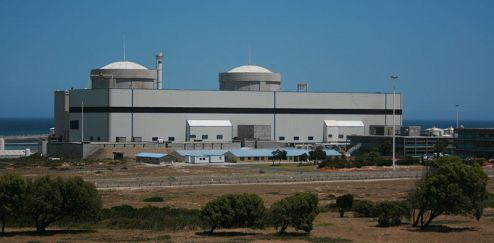South Africa is experiencing an energy crisis due to lack of foresight by our main energy supplier. A parastatal(an organization which provides services to the government) named Eskom. South Africans have had to adjust to load shedding which is when an area has its power supply shut off in order to lessen the burden on the power grid. Although less load shedding has occurred over the past two years it has not been eradicated. The cost of electricity has increased rapidly. I’m writing this post because I’m witnessing and affected by these electricity hikes. In my community, several longstanding bakeries are closing down because they cannot afford to keep their ovens switched on. My mom who receives a state-funded pension as she cannot work because she cares for my disabled brother is also feeling the increased burden of having to pay more for electricity.

My mom also happens to be a superstar water and electricity saver. She recycles items and fixes them and I have inherited her waste not attitude. There are many people in Cape Town who like my mom use electricity sparingly. Logic dictates that this is a good thing as Capetonians are placing less strain on the power grid. Nonetheless, the City of Cape Town is proposing a major hike for electricity. The new billing system would mean that Cape Town’s residents would pay a baseline levy in addition to paying for the cost of electricity units used (Caboz,2018). This is because the city cannot afford to provide electricity which is based on the charging for consumption only model which is currently in place (Ibid, 2018). Our national government plans to build a nuclear energy plant in order to solve the country’s energy woes, however, our civil society organizations and ordinary citizens are joining together to stop the deal. It has been halted because proper legal steps were not executed by the government. This proposed solution is problematic due to several issues with nuclear power as well which I will briefly outline.

Koeberg Nuclear Power Station the only nuclear power plant in Cape Town. It was attacked in 1982 during it’s building phase by anti-apartheid activists, Image Source: Pipodesign Philipp P Egli [CC BY 3.0 (https://creativecommons.org/licenses/by/3.0)
It is passé
Environmental friendly energy production is the way of the future. Forward-thinking nations such as Germany are trying to become more and more reliant on green energy. Angela Merkel has been pressurized by the general public to change how Germany creates energy. Nuclear energy is no longer the only option. Nuclear power is also unsustainable. It is therefore not cutting edge and we should make use of the technology which we have to create sustainable solutions to problems.
Nuclear meltdown and incidents
This is the most obvious concern as human beings are responsible for building and maintaining nuclear reactors. If I made a mistake at my workplace I was able to apologise, learn and correct my mistake. When it comes to a worker in a nuclear plant a mistake can have deadly consequences. The 1986 Chernobyl is the most famous core meltdown. However, the first core meltdown occurred in Harrisburg in 1979 located in Southern Germany (Rosenkrantz, 2006, p.16). There is also the Paks Nuclear Power Plant incident Paks is located 115 kilometres from Budapest, Hungary. The damage was contained overheating occurred and 30 extremely “radioactive fuel assemblies were damaged”(Ibid,2006,p.12). In March 2011 an earthquake and tsunami lead to another nuclear this time at the Fukushima Daiichi Nuclear Power Plant in Japan (Anzai, Ban, Ozawa & Tokonami, 2012, p.2).
Nuclear waste is a lasting dilemma
Nuclear waste remains radioactive for thousands of years. There is currently no facility which can store the waste in the world which is completely secure. Nuclear energy, therefore, creates by-products which are lethal and harmful to the environment.
Nuclear energy is expensive
You cannot exactly create a budget-friendly nuclear energy as safety needs to come first. In South Africa building the proposed reactor will cost R1.2 trillion. In a country which is confronted with a plethora of developmental challenges can this exorbitant cost be justified? The money could be spent on other important ventures such as building schools. “Valued at R60, 000,000 a completely modernised and up-to-date school facility would revolutionize education in South Africa” (Head, 2017). 15,000 progressive schools can be built using the proposed R1.2 trillion (Ibid, 2017). Our country desperately needs better education infrastructure.
Nuclear energy is shrouded in secrecy
The public is not allowed to know about all the details of South Africa’s nuclear energy deal. We do know that Russia will help build it and Russian workers will be building the plant. The tender process is confidential and many other details. The information regarding a nuclear power plant is sensitive. Despite this South Africa is a country with high levels of corruption in every sector of society. This makes the secrecy needed to create a nuclear power plant especially problematic.
The Russian connection
The media is quick to demonize Russia having a close friend who happens to be Russian has changed my view of Russia. South Africa has good relations with Russia. It also joined BRICS consisting of Brazil, Russia, India, China and South Africa it is an organization created to promote development, provide financial and economic support to member countries. Although I see BRICS as an organization with great potential agreeing to a nuclear deal with Russia is illogical. Russia’s economic growth has slowed down. Russia does not have the ability to pay back its nuclear debt thus, relying on Russia for electricity and funding just does not make sense.
Nuclear energy may lead to nuclear weapons
South Africa is the first and only country to voluntarily dismantle its nuclear weapons. Having a nuclear reactor is closely related to creating nuclear weapons. This is why it is a sensitive matter in places like Iran. Having a nuclear reactor creates the room needed to create nuclear weapons. In my opinion, South Africa really should not build a nuclear power plant as it creates the foundation needed to produce nuclear weapons.
Terrorism
South Africa has not been subject to many terrorist attacks. We do not really talk much about terrorism and are shocked when we hear of stories of ISIS infiltrating South Africa. We are vulnerable to terrorist attacks as little is being done to prevent them from happening. “Political scientist Dr Hussein Solomon said the South African government had done precious little to monitor the local threat of terror groups” (Wicks, 2018). A 15-year old girl from Cape Town was removed from a flight she was on her way to join ISIS. She admitted that she was travelling in order to join ISIS. Her parents had been vacationing in Durban at the time. She was in the care of her grandparents at the time. She snuck out through her bedroom window and her grandparents altered the police as soon as they noticed that she was missing. The police alerted the airport officials and she was returned to her parents after debriefing (Ebrahim, 2015). This case ended with the girl returning home safely but there are reports that as many as 150 South Africans have joined ISIS. Indeed the Abbottabad Papers indicates that Osama bin Laden saw South Africa as an “open territory” for al-Qaeda’s operations (Institute for Security Studies, 2015).
A terrorist attack directed at a nuclear power plant would have devastating effects. The 9/11 attacks have made it clear that terrorists are willing to kill themselves along with many innocent people in a public manner. Rozenkrantz states that“ Confessions by two imprisoned al-Qaida leaders indicate that nuclear power plants were identified among the targets considered” (Rozenkrantz,2006,p.20). This information scares me and I have no idea why policymakers are not considering this threat. Marketing a nuclear power plant as safe is wholly untrue as shown by this quote alone. Given all these concerns maybe alternatives are in order.
There are alternatives
South Africa has other options which will be able to produce clean, sustainable and environmentally friendly energy. We can use solar energy as South Africa is, in general, a sunny country. Anyone who has experienced Cape Town’s gale force winds will know that wind-powered energy is a better option. South Africa also has an extensive coastline surrounded by the Atlantic and Indian Ocean hydraulic energy is another viable solution. The cost of initial investment is pricey but in the long run, green energy is much cheaper than nuclear energy. Thus the claims by South Africa’s government that nuclear energy is the only way out is inaccurate. There is a better way.
Sources
Anzai,K, Ban,N, Ozawa,T. & Tokonami,S. (2012). Fukushima Daiichi Nuclear Power Plant accident: facts, environmental contamination, possible biological effects, and countermeasures, Journal Clinical Biochem Nutr, 50(1): 2-8
Caboz,J. (2018). Cape Town is changing the way it charges for power because its residents are using too little electricity. Here’s what it will mean for your power bills, from: https://www.businessinsider.co.za/heres-why-cape-towns-radical-change-in-the-way-it-charges-for-electricity-wont-end-up-costing-anyone-anything-extra-you-just-wont-save-either-2018-4
Ebrahim, S. (2015).Cape girl stopped from joining IS, from: https://www.iol.co.za/news/cape-girl-stopped-from-joining-is-1841189
Head, T. (2017).What could R1 trillion buy South Africa instead of a nuclear deal?, from: https://www.thesouthafrican.com/what-can-you-buy-for-r1-trillion-nuclear-deal-price/
Institute for Security Studies. (2015). Are South Africans soft targets for ISIS recruitment?, from: https://issafrica.org/iss-today/are-south-africans-soft-targets-for-isis–recruitment
Rosenkrantz, G. (2006). Nuclear Power: Myths and realities the risks and the prospects In Henrich Böll Stiftung, Nuclear Power: Myth and reality, p.11-48, South Africa, Creda Communications
Wicks, J.(2018). Isis a real threat in South Africa, from: https://www.timeslive.co.za/amp/news/south-africa/2018-02-26-isis-a-real-threat-in-south-africa/

Thank you for reading and please do feel free to comment. I would love to hear if you agree with me or disagree and why. I love reading comments on my blog so do comment if you want to. If you would like to collaborate with me or if you would like me to write a guest post for you do let me know via the comments or e-mail me.
Wishing you all happy travels through the journey of life!
xxx Nikki xxx

Interesting post! I was in Johannesburg a couple years ago when they were experiencing a major draught and there were signs in the restrooms asking people to conserve water.. When it comes to nuclear energy, the technology has come a long way and personally I don’t think it should be ruled out entirely. Solar energy is much more expensive, especially for developing nations that are rapidly growing and need power.
LikeLike
I understand your point however in the long run nuclear energy is actually much more expensive. The cost of green energy is becoming cheaper every year whilst nuclear energy costs are increasing. But in some cases it is necessary to maintain nuclear energy sources. Replacing exsiting plants with green alternatives would certainly be too expensive. In the case of South Africa though expanding our nuclear energy production is complicated as corruption runs rampant. Due process wasn’t followed and as I have mentioned the Russian connection is dubious. But I do agree that in certain cases it is needed. I just personally feel that it’s a bad option for my country at the moment.
LikeLiked by 1 person